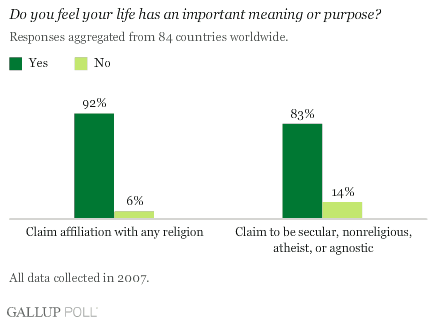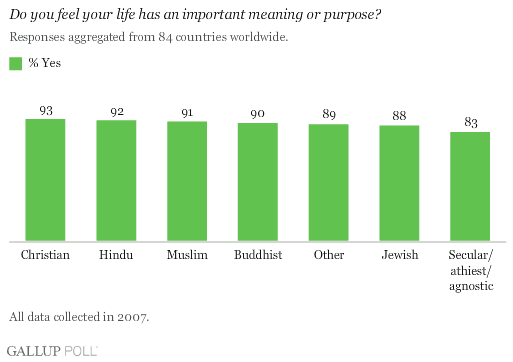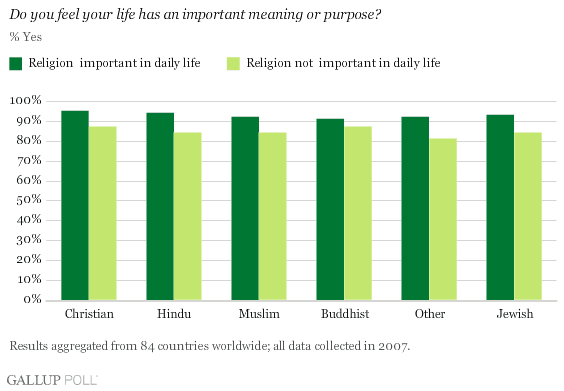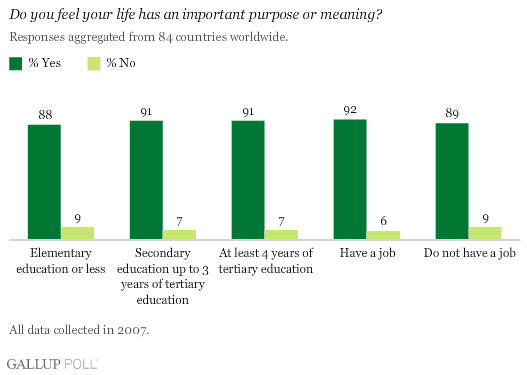Takeaway: Regardless of whether they affiliate themselves with a religion, more than 8 in 10 respondents across 84 countries say their lives have an important meaning or purpose. However, religion does make a difference: Those who claim no religious affiliation are more than twice as likely as those who do claim one to say they do not feel their lives have an important purpose.

WASHINGTON, D.C. -- President-elect Barack Obama's choice of Rick Warren to deliver the invocation at next month's inauguration ceremony met with protest from gay rights advocates, but the evangelical pastor's influence and appeal are undeniable. His 2002 book The Purpose-Driven Life has sold a record-breaking 25 million copies worldwide; in it, Warren maintains that appreciating the significance of one's own life requires learning about God's plan for humanity. "You were made by God and for God," Warren writes, "and until you understand that, life will never make sense."
To what extent is Warren's devotional message reflected in the self-perceptions of people around the world? In 2007, Gallup asked respondents in 84 countries worldwide the following question: "Do you feel your life has an important meaning or purpose?" Examining how the responses differ among members of the world's major religions -- and between those who do and do not make religion an important part of their daily lives -- provides a look at the existential grounding that Warren and other evangelicals attribute to religious commitment.
Key Findings
The first point to make is that Warren overstated the case. When asked "Could you tell me what your religion is?" only 2% of all respondents worldwide said they were secular or nonreligious. But among this secular group, more than four in five (83%) said their lives do have an important meaning or purpose. So there is a high baseline percentage of people who see purpose in their lives, regardless of their religious orientation.
The second key point, however, is that beyond that baseline, religion does make a significant difference. Respondents who claim affiliation with a religious tradition -- any religious tradition -- are more likely than those who do not to say their lives have an important purpose. Secular respondents are more than twice as likely as those who affiliate with a religion to say they do not feel this way -- 14% vs. 6%, respectively.
There is little variation among members of the world's most prominent faith traditions when it comes to feeling one's life has an important purpose. Roughly 9 in 10 Christians (93%), Hindus (92%), Muslims (91%), Buddhists (90%), and Jews (88%) feel this way.

Talking the talk vs. walking the walk
Gallup Polls worldwide also offer some evidence that it's not just religious affiliation that makes a difference in the feeling that one's life has meaning, but whether that faith is actively practiced. We can begin to make that distinction by separating members of each faith who say religion is an important part of their daily lives from those who say it is not. Those in the latter group are not the truly secular respondents identified previously, but may represent the less actively involved members of each faith tradition.
Breaking these groups out reveals that among adherents to most faiths, those who say religion is not an important part of their daily lives are significantly less likely than those who say it is an important part to feel their lives have important meaning. In other words, as Warren and other evangelicals would argue, failing to practice one's faith in daily life is less likely to result in spiritual enlightenment.

Faith vs. work and education
Finally, to provide some basis of comparison for the effect of religion, we can break the "meaning or purpose" results down by other variables, such as employment status and education level.
What we find is that neither employment status nor education level is as significant as religion. In the aggregate across all 84 populations studied, respondents who say they do not have a job are only slightly less likely than those with jobs to say their lives have an important meaning or purpose (89% vs. 92%, respectively). Similarly, respondents with elementary educations or less are only slightly less likely than those with more education to feel this way (88% vs. 91%, respectively).

Bottom Line
There is some support in Gallup's data for Warren's premise that religious involvement makes devotees more likely to feel their lives have a purpose. On the other hand, the results also suggest that religious involvement is not necessary for most people to feel that way. What's more, this effect is hardly unique to Christianity; it applies in similar measure to most of the major religious traditions examined in this article.
That religion has more of an influence than education or employment on responses to this question may also speak directly to the needs that religion fills in developing countries. As researchers have long noted, religiosity tends to be highest among poorer, less educated populations -- providing a source of hope where it is most needed. As these data indicate, religion can also provide a much-needed sense of direction for those to whom life might otherwise seem futile.
Survey Methods
Results are based on telephone and face-to-face interviews conducted in 2007 with approximately 1,000 adults per country across 84 populations spanning all major global regions.
The countries and territories included in this analysis are as follows:
Africa: Burkina Faso, Cameroon, Central African Republic, Chad, Congo (Kinshasa), Egypt, Ethiopia, Ghana, Guinea, Kenya, Liberia, Malawi, Mauritania, Morocco, Mozambique, Namibia, Niger, Nigeria, Senegal, Sierra Leone, South Africa, Sudan, Tanzania, Uganda, Zambia, Zimbabwe
Americas: Argentina, Belize, Brazil, Chile, Colombia, Costa Rica, Dominican Republic, Ecuador, El Salvador, Guatemala, Guinea, Guyana, Honduras, Mexico, Nicaragua, Panama, Paraguay, Peru, Uruguay, Venezuela
Asia: Australia, Bangladesh, Cambodia, India, Indonesia, Iran, Israel, Japan, Jordan, Laos, Malaysia, Mongolia, Nepal, New Zealand, Pakistan, Palestine, Philippines, Saudi Arabia, Singapore, South Korea, Sri Lanka, Thailand, Vietnam
Europe: Belgium, Czech Republic, Denmark, France, Germany, Greece, Hungary, Italy, Netherlands, Poland, Romania, Spain, Sweden, Turkey, United Kingdom
Results from each country have an associated sampling error of ±4 percentage points. In addition to sampling error, question wording and practical difficulties in conducting surveys can introduce error or bias into the findings of public opinion polls.
